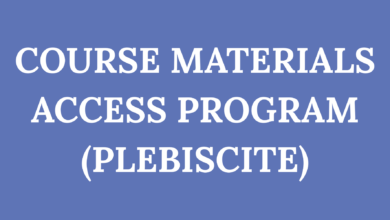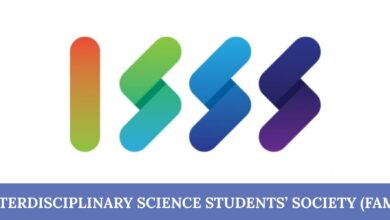SU Elections 2024: International Students’ Association Forum Recap
The second University of Alberta Students' Union 2024 elections forum was hosted by the International Students' Association forum.
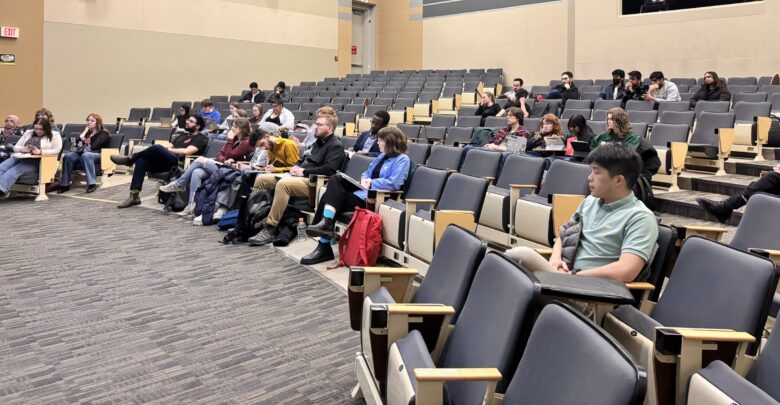 Lale Fassone
Lale FassoneNOTE: The Gateway is running a DFU campaign in the 2024 Students’ Union Elections. We will be covering our campaign in a strict environment that strives to promote impartiality, transparency, and fairness. If you’d like more information, please see our statement or Conflict of Interest Plan.
The third forum of the University of Alberta Students’ Union (SU) 2024 elections was hosted by the International Students’ Association (ISA) on February 29. The event was offered in-person and online.
Candidates were given two minutes each for opening statements. Each race was then asked a question by the ISA’s incoming co-presidents, Ramish Raza and Hannan Sandhu. Audience members were then given the chance to ask questions during open forum.
Here is the TL;DR version of this forum:
- President: advocating to university administration, the provincial government, and the federal government
- Vice-president (external): international student study permit caps, work hour caps, and ISA representation
- Vice-president (operations and finance): engagement between the SU and the ISA, discount opportunities
- Vice-president (academic): hybrid learning models and scholarships for international students
- Vice-president (student life): creating diverse representation and supports for international students
- Board of Governors Representative: supports for international student tuition increases and through virtual platform
- HUB Community Association: providing advocacy for residents and maintaining The Vault
- The Gateway: gives international students expanded coverage
- The ISA: supports and services for international students
- The Landing: affordability and services for international students, expanding services
Presidential candidates discuss advocating for international students
In presidential candidate Lisa Glock’s opening statement, she said that during her time at the U of A, she has seen first-hand the “invaluable contribution of international students and what they bring to our university.”
“I am committed to championing your concerns, amplifying your voices, and working tirelessly to cultivate an environment where every international student feels valued, supported, and empowered to thrive,” Glock said.
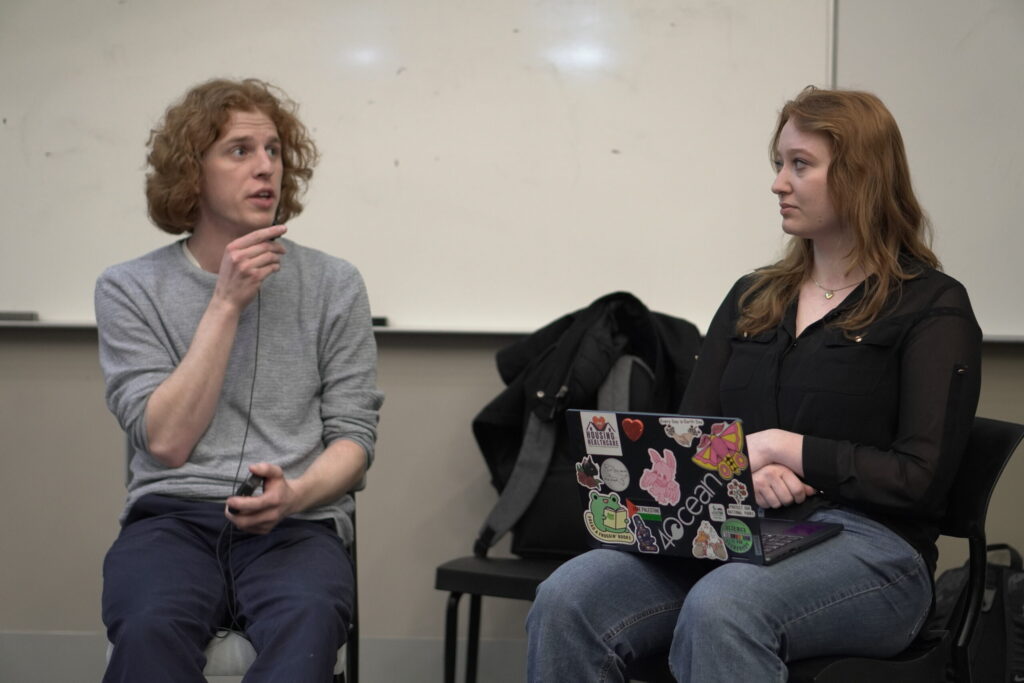
Next, presidential candidate and current vice-president (student life), Michael Griffiths, gave his opening statement. Griffiths said that as vice-president (student life), he was involved in the planning of International Student’s Day (I-Day) with the ISA. As well, he worked with the Campus Food Bank (CFB), which has a high-rate of international student clients.
“The role the president needs to play for international students is even greater. No other student on campus has a better platform to voice international students’ needs,” Griffiths said.
Later, Raza asked the candidates how they would engage with university administration to promote the inclusion of the ISA in discussions and decision-making. Additionally, he asked the candidates how they would ensure the ISA receives a permanent seat on the General Faculties Council (GFC).
Due to his experience as vice-president (student life), Griffiths said he has already established relationships with both the ISA and university administration. Regarding the GFC, Griffiths said there are currently vacancies for student positions. Griffiths said he could work with the ISA to have students run for the already-established vacant positions.
Following Griffiths, Glock said she has an understanding of international student issues as her parents emigrated from Germany. As a U of A ambassador, she has seen the difficulty of getting tuition payments from foreign banks, she said. Glock also questioned why empty seats on GFC are not being allocated to the ISA. Finally, she said the ISA should have a seat on the Tuition Budget Advisory Committee (TBAC).
During open forum, The Gateway asked the candidates about what approaches they would take when advocating to the university, provincial government, and the federal government regarding financial pressures on international students, such as tuition and cost-of-living.
Glock said she wants to work with other universities in Alberta, as international students across campuses face similar issues. Additionally, Glock said there is a need to spread information regarding international students’ issues. She mentioned a mailing list as one way to accomplish this.
Following Glock, Griffiths said that at the federal level, he plans to work with the Canadian Alliance of Student Associations (CASA) to advocate against the international student cap on work hours. To work with the provincial government, Griffiths mentioned strengthening the Council of Canadian University Students (CAUS) and demonstrating to the provincial government the value international students bring to Alberta’s economy.
-Dylana Twittey
Vice-president external candidates discusse international student study permit and work hour caps
In her opening statement, vice-president (external) candidate Logan West brought up her experience as an international student in California. During this time, West used a food bank and faced housing insecurity, she said. As a result, these issues are important and personal to her.
“I will fight to make sure that international students’ voices are heard and valued at all levels of government,” West said.
Vice-president (external) candidate Abdul Abbasi said he will work towards culturally inclusive mental health support.
“If you go to [a culturally inclusive] advisor, they know what you’re dealing with instead of taking it from a Western point of view,” Abbasi said.
Later, Raza asked both candidates how they would ensure the ISA is included in key university committees, like TBAC. He also asked how they will make sure international students’ perspectives are effectively represented.
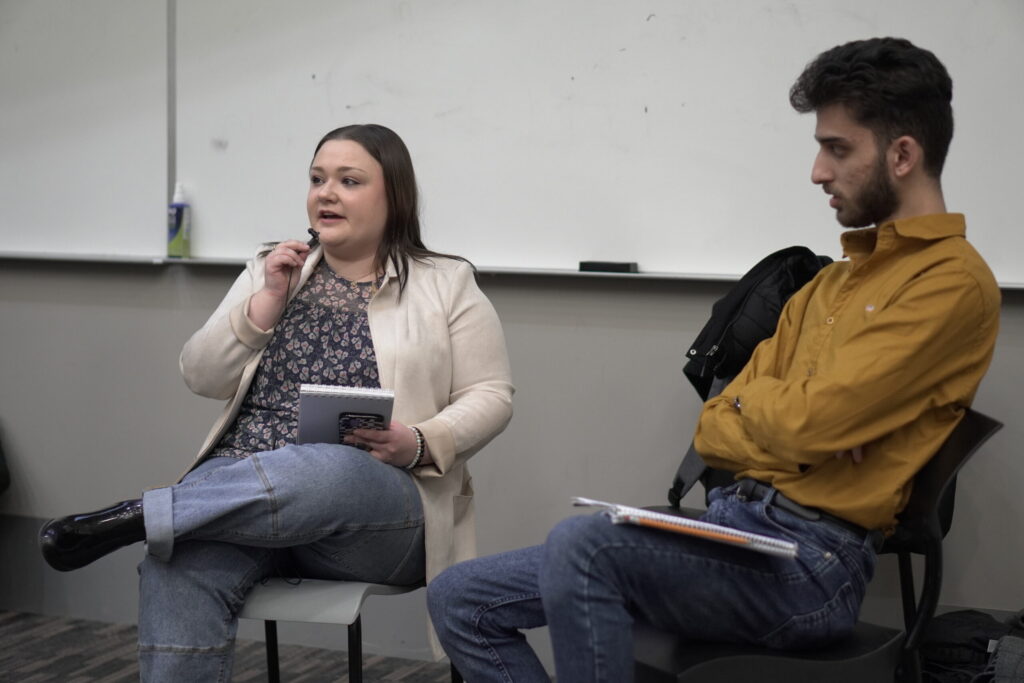
Following consultation with the ISA, Abbasi was told that although the university presents tuition and budget changes to the ISA council, they do not show the implementation of feedback.
Although the vice-president (external) does not sit on TBAC, Abbasi said it’s important that they work with the university, and both the incoming vice-president (academic) and president, to get the ISA a seat.
West said that she will have “close collaboration, effective communication, and genuine and effective consultation, [to] ensure that the ISA’s voice is heard when [they] go to TBAC.”
Both Raza and The Gateway then asked how the two candidates plan to work with the ISA to ensure the interests of international students are heard, especially regarding the cap on international study permits and the waiver on the 20-hour work week limit, which is set to expire April 30, 2024.
Abbasi said that Alberta is “fortunate” to have an increase in international students by 7,300. Abbasi said he received this information from an Immigration, Refugees, and Citizenship Canada town hall. The allotment of the cap for Alberta has not been announced yet. Abbasi continued, saying that the province has had a short amount of time to react to these changes.
Regarding the cap on work hours, Abbasi said that he will be working with CAUS and the ISA to show the government the difficulties of obtaining a work permit.
West said the work-hour cap will affect both international students and the U of A, since it will strain university resources, like the CFB and mental health supports.
West said that if the number of international students increases at the U of A, there needs to be funding and resources available to accommodate them. “In the unlikely event” that there is a reduction, she plans to collaborate with the ISA to advocate for international students and their value to the campus community, workforces, and the community at large.
-Lale Fassone
Vice-president (operations and finance) candidates talk about affordability and support-systems,
In his opening statement, Joachim Bony, candidate for vice-president (operations and finance), talked about his experience advocating for international students as vice-president (operations and finance) for the Association des Universitaires de la Faculté Saint-Jean (AUFSJ) at Campus Saint-Jean (CSJ).
Following consultations, Bony said he has heard two main concerns from international students. These include a lack of a support system when students first immigrate to Canada, and affordability.
Bony also discussed the SU launching a new job registry to help international students find employment. Additionally, he said he wants to extend SU Perks, so students have access to more discount opportunities. Lastly, Bony expressed that he wants to improve the SU’s outreach to students.
“I want to make sure that our SU is known by students … especially international students, because they lack a support system. I want to make sure that the SU is their family away from home to support them,” Bony said.
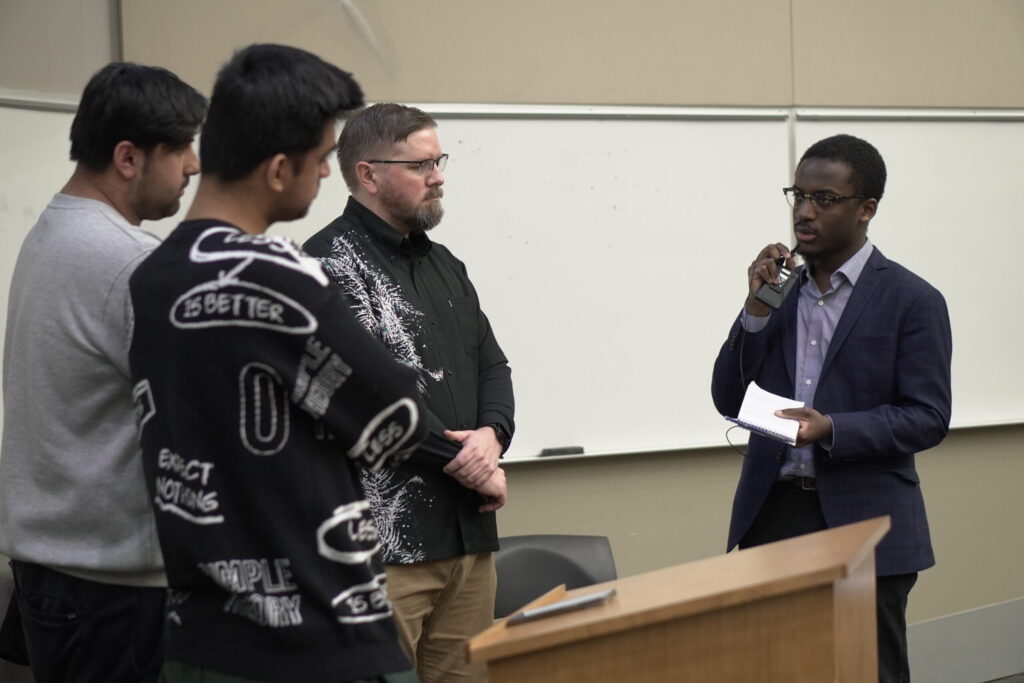
Although vice-president (operations and finance) candidate Levi Flaman — who’s running for re-election — is not an international student, he said he has experience with international issues through his degree.
Flaman said it is the SU’s responsibility to create a welcoming campus for “all students regardless of their place of origin.” To further this, Flaman suggested doing an Equity, Diversity, Inclusion, and Accessibility (EDIA) audit on the SU, which would pinpoint EDIA deficiencies.
He also mentioned that there should be more Halal, Kosher, vegetarian, and gluten-free items offered in SU-run businesses.
-Declan Carpenter-Hall
Vice-president (academic) candidates discuss hybrid learning opportunities, scholarships for international students
In her opening remarks, vice-president (academic) candidate Farah Elgaweesh said that exceptional tuition increases have “specifically affected international students, who are already financially burdened by living costs.”
Elgaweesh said that by supporting initiatives like the Zero Textbook Cost (ZTC) program, “we can ensure that no student is left behind due to financial constraints.”
Beyond affordability, Elgaweesh said she envisions a campus where asynchronous, hybrid learning opportunities are normalized for accessibility, she said.
After, vice-president (academic) candidate Layla Alhussainy said that she has consulted with international students in her position as vice-president (internal) of the Organization for Arts Students and Interdisciplinary Studies (OASIS), and by sitting on the Council of Faculty Associations (COFA) and GFC.
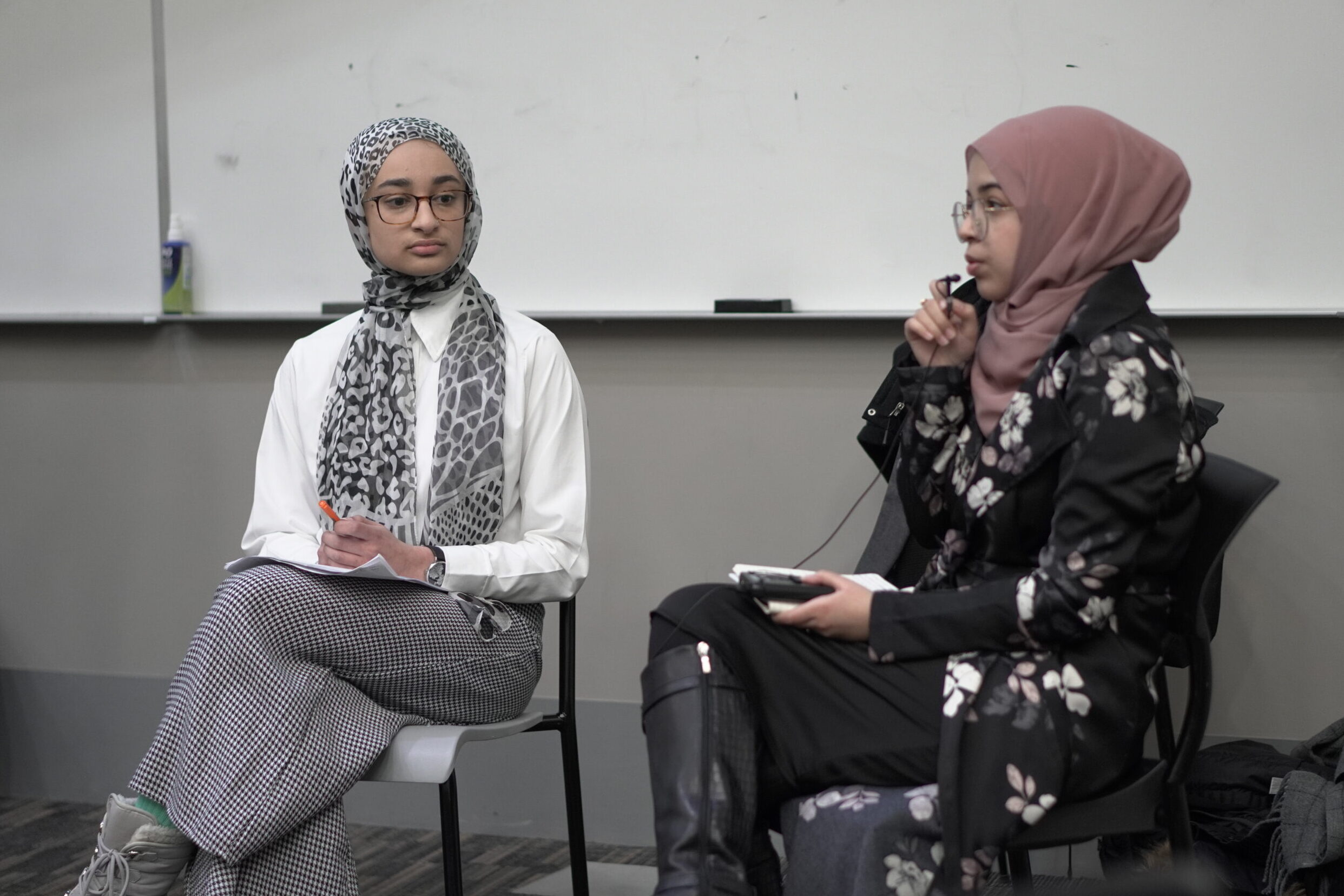
Alhussainy said most of the feedback she has gotten relates to international students “transitioning in a new country.” She said that existing modules used to help these students transition should be placed on eClass. As well, Alhussainy pushed for experiential learning in classes, and accessible hybrid learning opportunities. Lastly, she mentioned “making sure that EDI is not an afterthought, but [is] integrated from the start.”
Raza asked both candidates how they would increase the availability of scholarships “specifically designated for international students within the SU, recognizing the financial challenges they often face.”
Alhussainy said that with the rising cost-of-living, scholarships are “an essential part of resources that should be available” to international students. She said she plans to use her relationships at GFC and work with the SU vice-president (external) to consult different groups and provide scholarships.
Elgaweesh replied that scholarships for international students were an “important issue” she had discussed with the ISA’s president and vice-president (academic).
“I’m going to advocate for more money to be allocated towards the priorities that students have on campus. And that is definitely a priority,” Elgaweesh said. She said she would first consult with ISA executives to determine the quantity of scholarship funds.
-Aparajita Rahman
Vice-president (student life) candidates aim to expand diverse representation options for international students
In his opening statement which was delivered virtually, vice-president (student life) candidate Adrian Lam focused on better supports for international students. He said that he wants to ensure that international students don’t “have to choose between accessing their tuition, food costs, or rent costs.”
Following Lam, vice-president (student life) candidate Renson Alva discussed ensuring safety on public transportation as well as on campus.
“I’m a commuter, so I take [the] LRT, and safety is a big concern. Especially [for] international students coming from so many backgrounds, and some of us being Black, Indigenous, and people of colour (BIPOC). It’s a big thing for us,” Alva said.
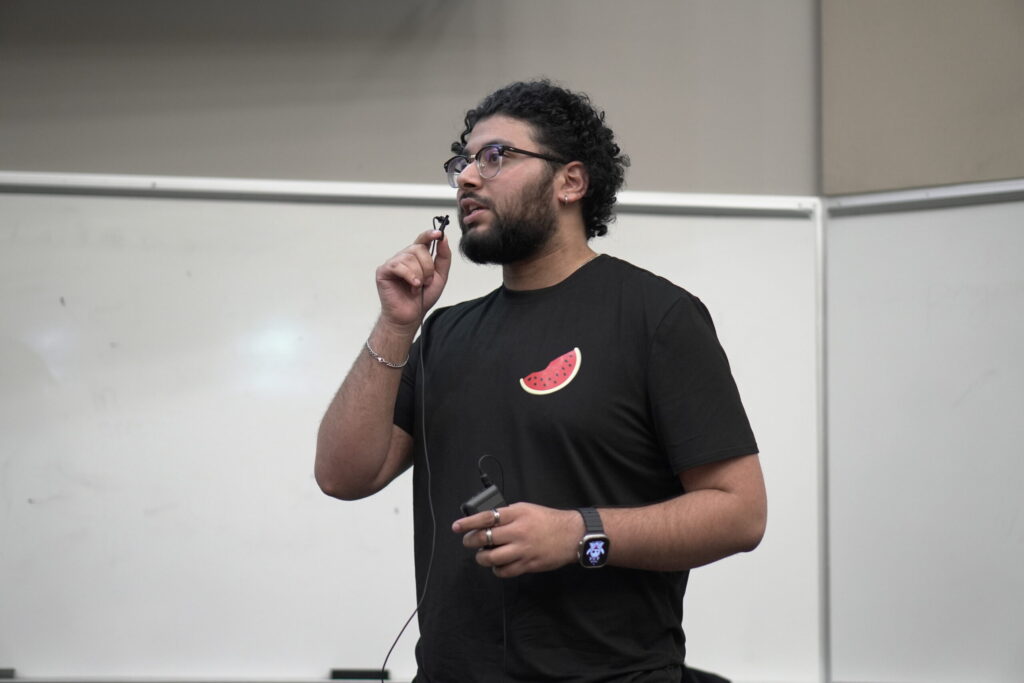
He said he’d like to work on transit safety through direct consultations, promoting Transit Watch, and exploring other solutions. Alva also mentioned potentially re-introducing the taxi refund program for students on Augustana Campus.
Raza asked the candidates how they would support securing venues for I-Day events, considering that these spaces facilitate community-building and cultural exchange.
If elected, Alva hopes to be a “big brother” to the ISA and other groups by being a resource that they can go to if need be, he said.
“I want you to take the lead again on most of these things [because] it is your program. We just want to ensure your success,” Alva said.
Following Alva, Lam mentioned leveraging spaces within the SU Building (SUB). He discussed his plan to expand I-Day into I-Week, if elected.
“We have Indigenous Celebration Week, where we celebrate Indigenous students and their community. So why not do the same for our international student population, who are just as diverse and unique as the Indigenous student community.”
During the open forum, The Gateway asked the candidates how they plan to improve mental health supports for international students, if elected.
Lam said he plans to diversify mental health supports at the U of A to ensure that there are “counselors who understand the cultural backgrounds … for each of our student demographics.”
Following Lam, Alva introduced the potential for “working with clinical counseling services … to diversify the folks they hire.” This is to ensure cultural competency and representation for international students. Alva said he wants to work with students to “destigmatize accessing mental health supports,” because international students face barriers in accessing them.
-Peris Jones
Board of Governors representative candidate recognizes international students’ concerns, highlights supports on her virtual platform
In her opening statement, Board of Governors (BoG) representative candidate Adrien Lam expressed concerns that “international students aren’t feeling like their opinions are being heard.”
Lam said she will further develop her virtual platform to address international students’ concerns if elected. She said that it will include a “special section that filters out international students for a survey” to voice their concerns.
Raza asked Lam how she plans to advocate to BoG the ISA’s proposal for a cap on tuition increases for international students.
Lam emphasized her concern for the “high-spike” in tuition costs that international students have faced.
She does not think that these tuition increases are fair to “[international students’] education when they’re also juggling a second job to try and mitigate these costs.” Lam mentioned that her virtual platform will give international students a voice at BoG.
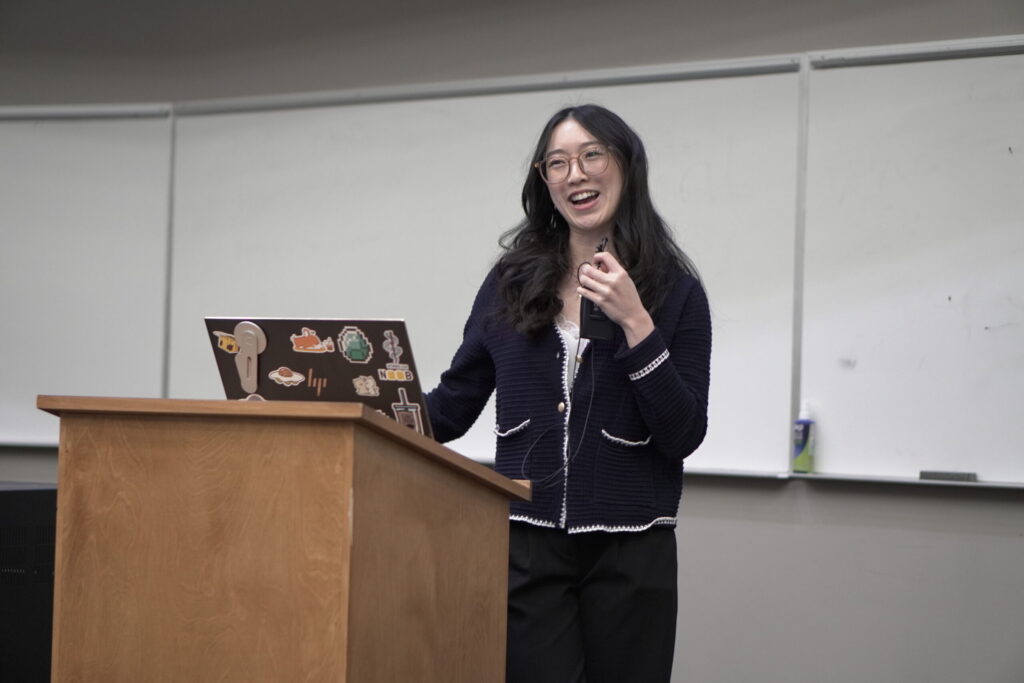
During open forum, an audience member said that the ISA is pushing for a limit on tuition increases. He asked Lam how she would advocate for this to members on the BoG.
Lam said that the job of the BoG representative is to “voice the students’ concerns,” and that her “number one priority [is] to represent them.”
“It doesn’t matter what I think. I will take the time to understand what the students think and I will vote on their behalf,” Lam said.
The Gateway asked Lam how she plans to address international student concerns both within her virtual platform but also outside of it, if elected.
Lam reinforced that the platform will allow her to filter out responses based on identity, if a student identifies “as part of a minority group.”
She discussed her virtual platform being available in multiple languages, as “that’s one of the problems with BearTracks [and] eClass.” Lam hopes to have a toggle on the platform where students can set their preferred language.
-Peris Jones
HUB Community Association FAMF will help “make HUB mall and this community a better place”
The HUB Community Association (HCA) referendum was presented by Kelvin Au, a fourth-year dietetics student and the HCA’s vice-president (finance and administration).
The proposed faculty association membership fee (FAMF) is $45 for residents of HUB mall. Residents would have the option to opt-out of the fee.
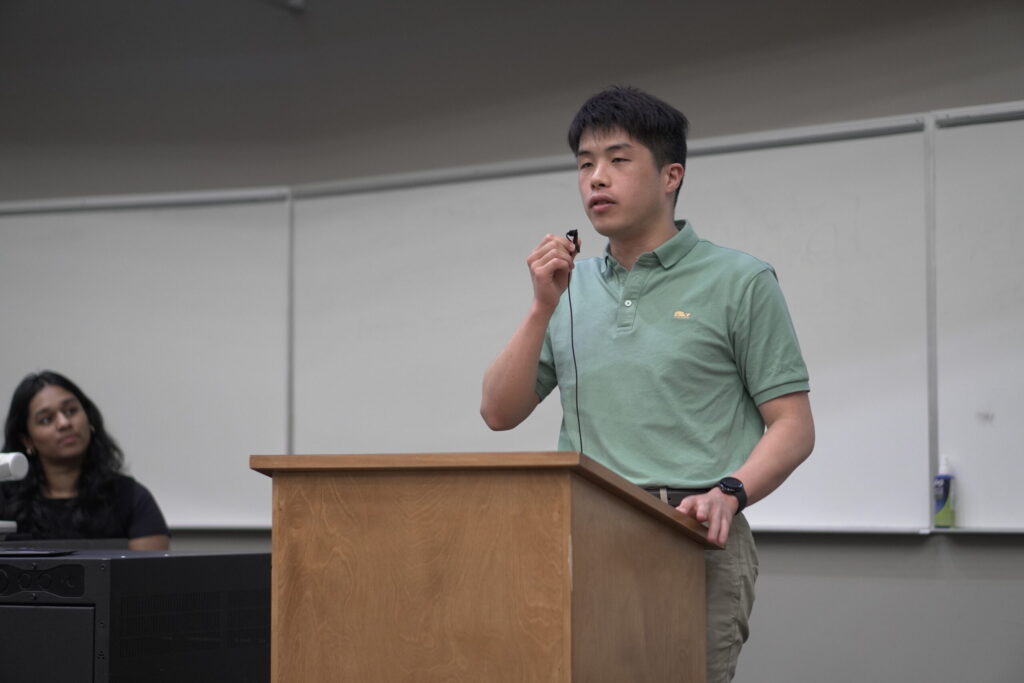
According to Au, the fee would help the HCA recruit student executives so they can advocate for issues that affect HUB mall residents, such as safety.
Additionally, the HCA runs The Vault and offers services like vacuum rentals, board game rentals. The Vault is the main common area for HUB mall residents and includes gym equipment, Au said.
“This $45 fee will help us purchase equipment as well as recruit executives that want to make HUB mall and this community a better place,” Au said.
–Dylana Twittey
The Gateway will “platform international students’ voices” through expanded coverage, board chair says
Emily Williams, chair of the Gateway Student Journalism Society (GSJS), presented The Gateway’s referendum.
The Gateway’s dedicated fee unit (DFU) would go toward reporting on campus news at the U of A. The proposed fee is $2.64 per fall and winter semester, and $1.32 per spring and summer semester. Students would have the option to opt-out. The fee would start from fall 2024, and continue for a five-year term.
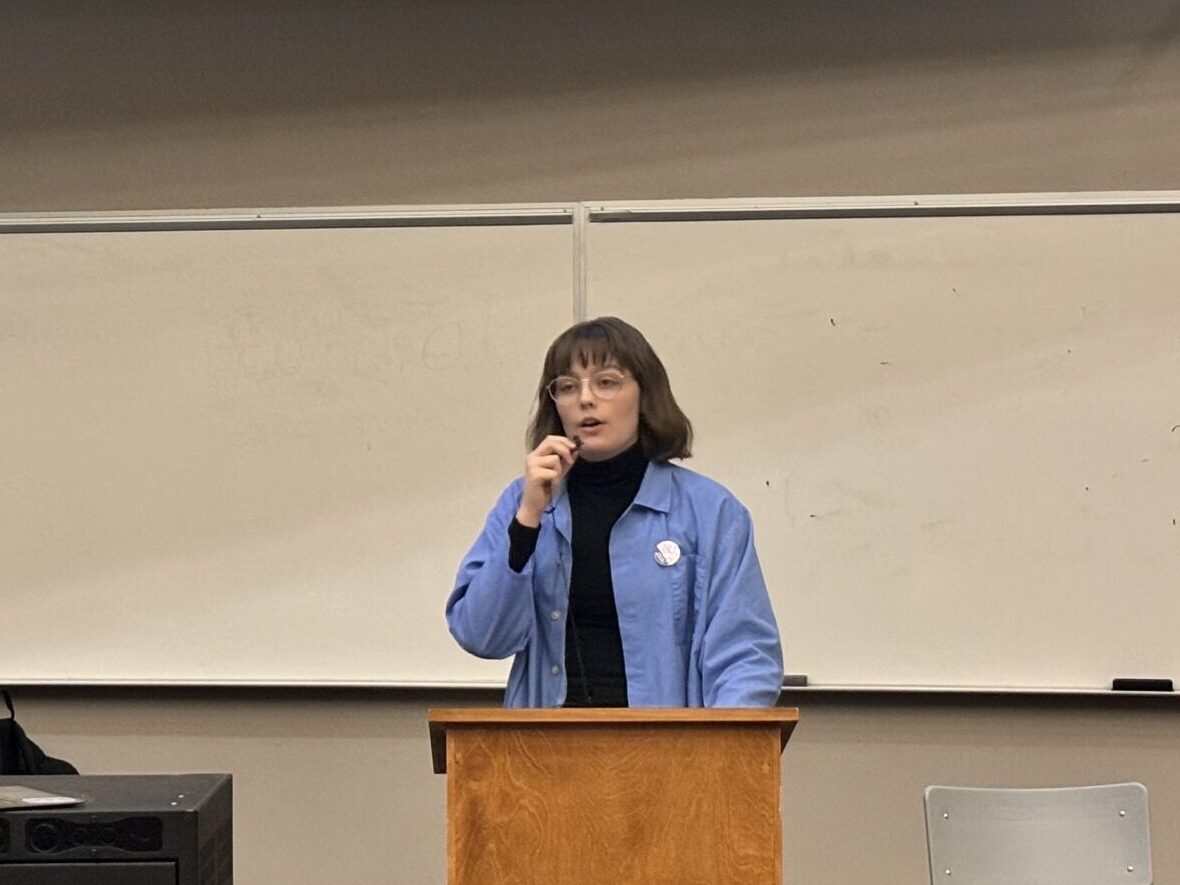
Williams shared that the first interview she conducted as a reporter for The Gateway was with former ISA President Chanpreet Singh, on the ISA’s revival “after years of inactivity, and having others ignore the voices of international students.”
As well, Williams mentioned that The Gateway’s guest column has featured writers from the ISA who platformed international students’ voices directly. News reporters have also expanded their coverage on students by attending ISA council meetings and publishing recaps online, Williams said.
“The Gateway is excited and ready to continue this work for another five years, fuelled by a $2.64 levy that will always be fully opt-outable.”
-Aparajita Rahman
ISA discusses its supports and services for international students
Aiman Saif, co-president of the ISA, presented the ISA’s referendum.
The ISA’s proposed FAMF is $5.00 for full-time undergraduate international students and $2.50 for part-time undergraduate international students, per fall and winter semester. The fee would apply to all U of A campuses for a three-year term. It would not apply to off-campus students in co-ops and internships. Students may opt-out of the fee.
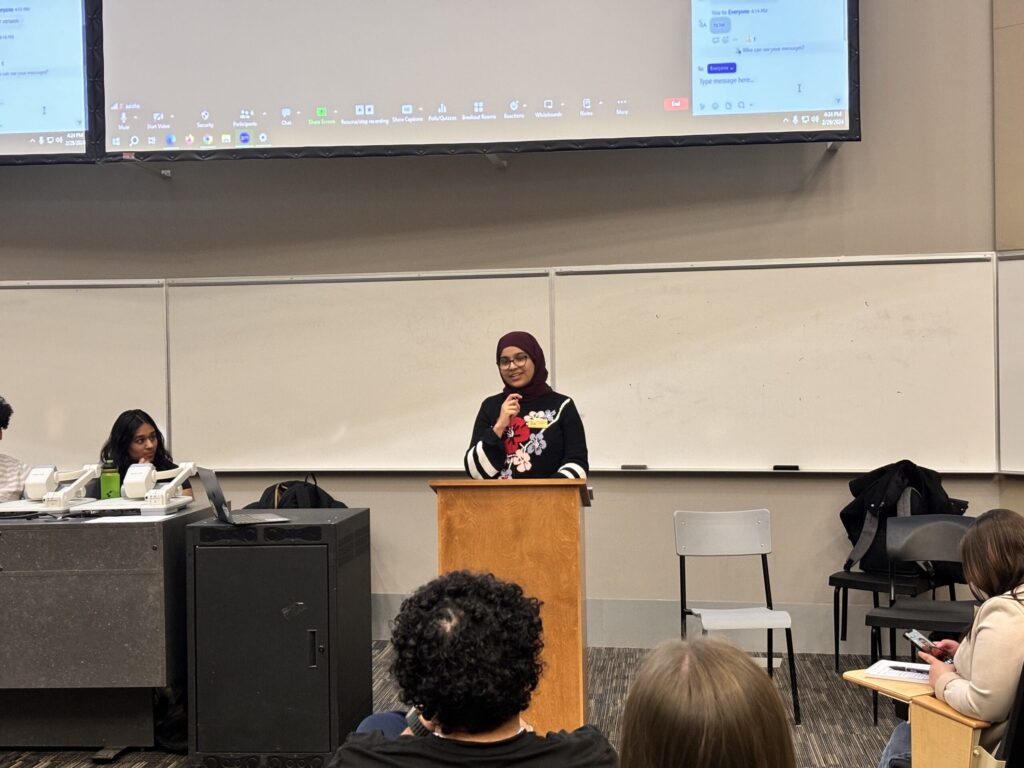
The FAMF goes toward providing international students with programs and services, like discounts for local vendors through the International Students’ Benefit Card (I-Card), Saif said. In addition, Saif said the FAMF also provides students with academic support, health and wellness workshops, and events, such as the ISA’s Welcome Program.
Saif said that if students use the I-Card even twice or thrice, they will make-up the ISA fee they are paying to the ISA.
Saif brought up a workshop the ISA is holding next week for navigating cultural differences as an example of what ISA offers. She added that workshops are free for all international students to attend.
-Lale Fassone
The Landing plans to expand services for all students on campus
Emily Lukacs, the student coordinator at The Landing, presented The Landing’s referendum.
The Landing is the U of A’s centre for gender and sexual diversity. It serves both queer and non-queer students who aim to promote wellness for 2SLGBTQ+ students.
The Landing is proposing to raise its fee from $1.85 per term for full-time students on North Campus, to $3.75. Lukacs explained that the fee is needed in order for The Landing to continue reliably providing current and extra services.
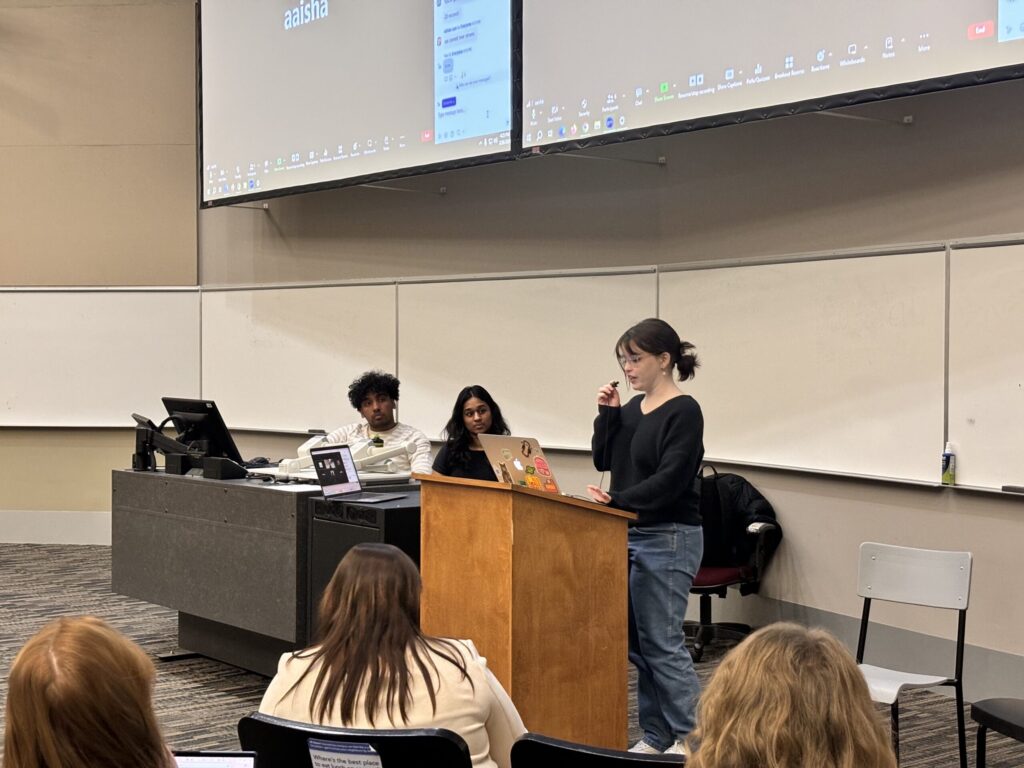
“With this budget, The Landing plans to expand its services including improved crisis and basic-need support; better outreach and education on gender and sexuality; [and] dedicated scholarships and emergency funding for queer students,” Lukacs said.
Lukacs explained that the fee is completely opt-outable, and The Landing understands the affordability issues international students may face. Lukacs added that The Landing provides services that may help.
-Lale Fassone



